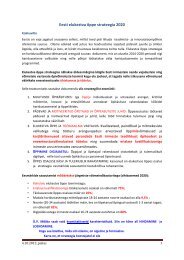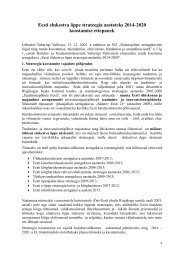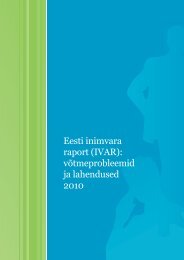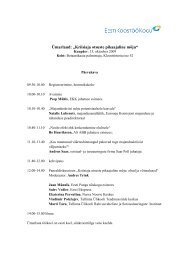Estonian Human Development Report
Estonian Human Development Report - Eesti Koostöö Kogu
Estonian Human Development Report - Eesti Koostöö Kogu
You also want an ePaper? Increase the reach of your titles
YUMPU automatically turns print PDFs into web optimized ePapers that Google loves.
Figure 6.2.7. Difference between the values of the<br />
subjective and objective indicators of well-being<br />
0,8<br />
0,6<br />
0,4<br />
0,2<br />
0<br />
-0,2<br />
-0,4<br />
-0,6<br />
-0,8<br />
-1<br />
Russia<br />
Finland<br />
ESTONIA<br />
Poland<br />
Romania<br />
Denmark<br />
Slovakia<br />
Spain<br />
Belgium<br />
Switzerland<br />
Latvia<br />
Ireland<br />
Sweden<br />
The Netherlands<br />
Slovenia<br />
Austria<br />
Ukraine<br />
Norway<br />
United Kingdom<br />
France<br />
Hungary<br />
Bulgaria<br />
Germany<br />
Portugal<br />
The greatest overvaluation of subjective well-being<br />
with respect to objective indicators exists in Russia. At<br />
the same time in Ukraine, which has a similar historical<br />
and cultural background, the indicators are much closer.<br />
Another interesting pair of countries is Bulgaria and<br />
Romania, where the situation is overvalued in Romania<br />
by a similar amount as it is undervalued in Bulgaria. The<br />
greatest dissatisfaction is expressed in Germany and Portugal.<br />
And why are people relatively satisfied with their<br />
life in Slovakia, but not so much in Slovenia, although<br />
Slovenia lies among the countries with the highest level<br />
of well-being? Apparently, we cannot answer these questions<br />
based only on the indicators included in the analysis,<br />
but more complicated cultural and social factors must<br />
be taken into consideration. The fact that satisfaction is<br />
always based on expectations must be taken into account.<br />
It can be said that in the highly developed countries with<br />
lower levels of satisfaction, such as Germany, France and<br />
England, expectations are greater for historical or cultural<br />
reasons.<br />
However, if we generally examine how the composite<br />
indicator of the objective side of well-being (including<br />
the country’s wealth, health, education, institutional<br />
organization and lack of alienation) is related to people’s<br />
satisfaction and feeling of happiness, then this correlation<br />
appears only in the group of countries with a higher level<br />
of well-being (correlations coefficient 0.915), while in lessdeveloped<br />
countries, satisfaction tends to be related not to<br />
the achieved level of well-being, but rather to the speed of<br />
economic growth.<br />
Estonia’s relatively high subjective assessments of<br />
well-being compared to the actual situation are probably<br />
impacted by rapid economic development and a discernible<br />
improvement in the standard of living compared to<br />
the recent past. This is an interim situation. Compared to<br />
References<br />
1. Berger-Schmitt, R., Noll, H. H. (2000) Conceptual Framework<br />
and Structure of a European System of Social Indicators<br />
– Eu<strong>Report</strong>ing Working Paper No. 9<br />
2. European Social Survey [http://ess.nsd.uib.no/index.<br />
jsp?year=2007] 30.09.2008<br />
the other transition countries, Estonia has achieved a relatively<br />
high level, which is to some extent comparable to<br />
the less-developed “old” European Union member states.<br />
However, in the case of Estonia, two points provoke interest:<br />
firstly, the comparison of the self-assessment of the<br />
society with the level of institutional development and its<br />
assessment; and secondly, how Estonia’s subjective level of<br />
well-being will be affected by the fact that we are moving<br />
from the league of Europe’s less-developed countries into<br />
the group of more-developed countries, where the general<br />
expectation level is more demanding and assessments are<br />
more affected by current objective institutional indicators<br />
than by comparisons with the past.<br />
Based on an assessment of wealth, we still lag behind<br />
the “old” EU member states, at least in the context of the<br />
statistical bases used in this chapter, as well as behind<br />
Slovenia and Hungary (the Czech Republic was not<br />
included in the sample of countries under examination);<br />
we barely outdistanced Slovakia, and are somewhat ahead<br />
of Poland, Latvia, Russia and the other countries of the<br />
former Soviet Union. However, by taking subjective satisfaction<br />
with the economic situation as the basis, we<br />
advance a few places in the ranking, overtaking Hungary<br />
and Portugal. Based on the human capital indicators, we<br />
outpace only Romania and Russia. The primary reason<br />
for the poor position is our short average life span. At<br />
the same time, our ranking based on the assessment of<br />
health and education is higher than that based on objective<br />
indicators. We are almost as satisfied with our health<br />
and education as the Germans.<br />
Estonia stands out for its high assessments of governmental<br />
organization, which are the best in the transition<br />
countries. Surprisingly high is the generalized confidence<br />
indicator, based on which we outpace Germany,<br />
France and England. As governmental organization is<br />
interpreted as an indicator of the objective preconditions<br />
for social capital at the macro level and confidence as the<br />
subjective indicator of social capital, one could draw the<br />
conclusion that Estonia has already exceeded the shortage<br />
of social capital inherent to transition countries and we<br />
are among the countries with a balanced and trustworthy<br />
organization of life that is characteristic of the Nordic<br />
countries. There are arguments both for believing this and<br />
for doubting it.<br />
Estonia’s ranking based on the assessments of general<br />
satisfaction and the feeling of happiness is approximately<br />
the same as that based on wealth. In other words,<br />
our much lower indicators for the quality of life – poor<br />
health and short life expectancy – have not affected our<br />
feeling of happiness or satisfaction to date. Or our belief<br />
in ourselves, our own prospects and institutional capacities<br />
has helped to eliminate the impact of these negative<br />
factors. The question is whether this optimism and positive<br />
attitude will survive the current period of economic<br />
recession.<br />
3. <strong>Human</strong> <strong>Development</strong> <strong>Report</strong> 2007/2008 (2007) United Nations<br />
4. Kaufmann, D., Kraay, A., Mastruzzi, M. (2007) Governance<br />
Matters VI: Aggregate and Individual Governance Indicators<br />
1996–2006, World Bank Policy Research Working Paper<br />
4280.<br />
| 130















